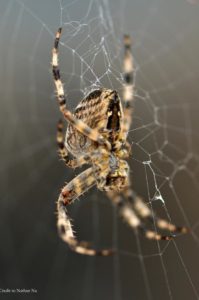
It took the bite of an orb weaver to make me realize the enormity of it. My husband had left me with two small boy children a couple of months before. He’d taken a job in another state. Our marriage had had its problems, but I didn’t even know he was looking at jobs out of state until he was called for an interview. When he moved 600 miles away I thought: I won’t panic, I’m resourceful. And I was. I had a career, an income, friends, a therapist, and a twelve-step program.
But I wasn’t looking out for the orb weaver. For the entomologically unenlightened, an orb weaver is a large, gorgeously patterned spider who spins elaborate webs to match her complexity. She (I imagine the gender, the female so rich with ambiguity when it comes to spiders) spun one–probably a pretty nice one–in my back door.
The trouble was I never appreciated it. I just stuck my head in it when I reached for the dog’s bowls. It was the last official act of a long day–feeding the neglected but still hopeful Australian shepherds in my life.
The spider must have thought, “Hallelujah!” or “Eureka!” or “Thanksgiving!” Something to express her delirium over the largest meal that had ever hit her net. And down she sprang.
I didn’t see anything till I felt something bonk my head. Right side, above and slightly behind the ear. It still feels a little numb to me–and this has been a good eight months now.
The night is long when you’re a single mother who has been bit in the head by a spider. I imagined, first, that nothing was wrong. Then that the tingly feeling was just my imagination. It didn’t take long to imagine myself stretched out on the floor for my five year old to find in the morning–grey-faced, my brain drained away by an orb weaver. It wouldn’t do any good to tell him there were no snakes or lobsters of crabs in the bed then, would it? Because there were spiders aplenty in doorways, and one of them had liquefied his mother’s brain.
My friend Kelly referred me to the poison control center–friend to all mothers but a special agency of grace to single mothers.
Not a black widow or a brown recluse?
No, much too big.
Probably tingle for a few days, then go away.
Which is what it essentially did.
When I knew I wasn’t dying, I let myself ask the question bubbling in my brain the whole time. Where was my husband?
I’ve pondered that question a few times since then. I thought about it when I had to call a colleague of mine, a philosopher, to bring me Pepto Bismol at midnight. (Philosophers are the only people I can think of who are awake at midnight and I only knew one.) I thought about it the times I hauled my kids on 10 hour trips to see their grandfather and a 12 hour trip (never to be repeated) to the beach, so they wouldn’t lose all those family things, though their father was gone. I thought about it when my work suffered–the books and articles not written, not read, the classes taught strictly by the seat of my pants, I thought about it when the entire month of November was lost to a series of viruses which ran relays through my kids and me, when I paid large amounts of money and depended on someone’s good will so that I could go to necessary conferences. I thought about it when I yelled at my kids and then felt awful for not mothering with the grace I’d meant to.
I thought about it when Kelly–one of the members of the absolutely fundamental single mom network I’m lucky to have–was on the phone and we were talking about how overwhelmed we felt. She told me she had just washed the floor (for the millionth time) at the end of a long day of juggling her own business and chasing kids without help when her little boy Max raced across it with muddy feet.
I yelled so loud my eyeballs hurt, Kelly said.
The summer before my husband drove away in North Carolina Susan Smith’s husband left her and she put her two sons in the back of her car and drove it into a lake. One hot day another single working mother not far from where I lived in Tennessee let her children roast in a closed van while she slept. My husband had been on some writers’ lists on the internet at the time and many intelligent, articulate, and generally reasonable people lost their minds and flamed about what a horror Susan Smith was. It was as if they, in their darkest imaginings, could see their own mother turning on them–or themselves turning on their own children.
Infanticide is a worse crime than patricide or fratricide. Even the Greeks didn’t see it as the same sort of entertainment as those other forms of murder. But they acknowledged its possibility in Medea, the queen who was stripped of her homeland and political power by her husband and then abandoned. Medea melted her husband’s new girlfriend with an enchanted dress and then killed the children she shared with Jason. Astonishingly, she was ultimately spared.
I don’t know why the Greeks–not well-known for being particularly pro-woman–let Medea off. I suspect it was because of the respect they had for the devastation caused by losing one’s political power, one’s dignity, one’s very identity. The cause of her crime was understandable to them.
I’m not defending Medea–or Susan Smith or that woman with the van. But I do see a twisted kinship. Each was given a big job–what is bigger, or more complex, or more important than mothering?–and then from each was taken that which would have made the job possible.
Why did no one see those women couldn’t take it, being stripped of their power and dignity, not to mention economic, physical, and moral support–rendered impotent in a culture that continues to define power by association with men? Why couldn’t anyone see this was beyond endurance?
In the end, Medea was lifted off the roof by dragons and carried into the sky, spared from a tortured death or any sort of retribution at all. Edith Hamilton points out that Jason “cursed her, never himself [italics mine], for what had come to pass.”
What I want to know is where were the husbands while their children suffered horrible deaths? And why were the fathers not held accountable? Why weren’t they reviled along with the mothers? Why were they not jailed? Why not try them too?
I’m not one to miss the irony that my husband–who took the side of the mothers on the internet and sent out a few flames in their defense–is also the man who drove off shortly thereafter with his computer in the back seat, leaving me—yes–with our two small children.
Where was he when the orb weaver bit?
I’m not going to kill my children. I’m among the majority of parents–single or not–who don’t want to see our children suffer a disappointment, never mind a hideous death. To repeat, I have resources–a secure income, age, a therapist, sobriety, and the knowledge of when to ask for help: all the time. But I’ve had plenty of spider days, days–and nights–when I thought: I just can’t do this.
And I can definitely see the time, before my kids are safely off to college, when I yell at them so loud my eyeballs hurt.
(originally published in Crab Orchard Review)

such a potent piece especially at this difficult time. I (unfortunately) have yelled so loud at my children that my eyeballs hurt. the worst part is afterwards, when you realize it is not their fault but you still can’t take it back.
thank you to women writers everywhere for reminding us that you are human, so that we don’t feel so bad about being human ourselves.
Hi, Rochelle,
Thank you so much for your kind words and the recognition that mothers everywhere can help each other through these trying times. I would have been completely lost without my fellow mothers! I’m happy to say that with my children now safely grown and having turned out quite nicely, it is very possible to take back the harm done by yelling (which I did a pretty spectacular amount of, including throwing their loaded toothbrushes at the wall so hard they stuck once, while yelling a particularly ripe curse), making sincere amends that don’t justify the act but recognize the challenges of both parenting and of being a kid with humility goes a very long way to helping kids understand that being human covers the full range of emotions and not all of them pretty. But sincere love and good will and honesty will get all of you through. My kids love me so much that we live in the same apartment building. Best, Ginger